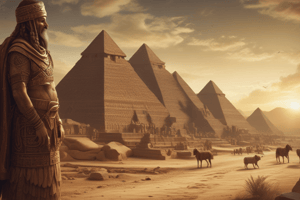Podcast
Questions and Answers
What invention did the Sumerians introduce that greatly impacted transportation?
What invention did the Sumerians introduce that greatly impacted transportation?
- The wheel (correct)
- Plows
- Roads and pavements
- Sailboats
Which writing system was used by the Sumerians to preserve history and culture?
Which writing system was used by the Sumerians to preserve history and culture?
- Latin script
- Hieroglyphics
- Cuneiform (correct)
- Pictographs
What was the primary purpose of the Great Ziggurat of Ur?
What was the primary purpose of the Great Ziggurat of Ur?
- A residential building
- A sacred temple (correct)
- A military fortress
- A marketplace
Which civilization is known for the construction of the Hanging Gardens?
Which civilization is known for the construction of the Hanging Gardens?
What agricultural innovation improved the efficiency of farming during ancient times?
What agricultural innovation improved the efficiency of farming during ancient times?
What was a key feature of the Sumerian social structure?
What was a key feature of the Sumerian social structure?
Which statement about the early civilizations is true?
Which statement about the early civilizations is true?
What was the primary use of papyrus in ancient Egyptian civilization?
What was the primary use of papyrus in ancient Egyptian civilization?
What was the primary purpose of the shadoof in ancient agriculture?
What was the primary purpose of the shadoof in ancient agriculture?
Which civilization is known as the cradle of politics and governance?
Which civilization is known as the cradle of politics and governance?
What technological advancement was crucial for the agricultural practices during the Middle Ages?
What technological advancement was crucial for the agricultural practices during the Middle Ages?
Which invention, attributed to Louis Pasteur, was significant for food safety?
Which invention, attributed to Louis Pasteur, was significant for food safety?
What were codex books made from in early history?
What were codex books made from in early history?
What was the role of the Antikythera Mechanism in ancient technology?
What was the role of the Antikythera Mechanism in ancient technology?
Which invention is credited with revolutionizing communication in the Industrial Revolution?
Which invention is credited with revolutionizing communication in the Industrial Revolution?
What material was commonly used in ancient cosmetics to protect the eyes?
What material was commonly used in ancient cosmetics to protect the eyes?
Flashcards are hidden until you start studying
Study Notes
Transportation and Navigation
- Ancient civilizations prioritized transportation for trade and safe exploration.
- Sumerians innovated with the wheel, enhancing movement and goods transport.
Communication and Record-Keeping
- Trade facilitation and conflict prevention were achieved through effective communication.
- Cuneiform, the oldest writing system, preserved cultural history.
Mass Production
- Agricultural advancements led to increased food production, meeting population demands.
- Weapons and armor development focused on security and protection.
Health
- Early civilizations made significant discoveries in disease prevention and cures.
Engineering and Architecture
- Societal needs guided the construction of essential structures.
- Architectural designs reflected technological progress and societal status.
Aesthetics
- Ornaments and decorative features were integrated into personal appearance.
Sumerian Civilization
- Located in southern Mesopotamia, known for social cooperation and achievements.
- Social structure divided into upper (kings, priests), middle (scribes, merchants, artisans), and lower classes (slaves).
Sumerian Innovations
- Cuneiform writing involved word pictures, essential for historical documentation.
- Invention of the wheel initially aided in farming.
- Sailboats enabled effortless water transport.
- Plow innovation enhanced farming efficiency by expanding arable land.
- Roads used sunbaked bricks for smoother travel.
- The Great Ziggurat of Ur served as a sacred temple for priests.
Babylonian Civilization
- Situated in southern Mesopotamia, famous for fertile land and diverse agriculture.
- Noted for impressive architecture and engineering.
- The Hanging Gardens of Babylon, built by King Nebuchadnezzar II, remain a debated wonder.
Egyptian Civilization (3150 BC)
- Focused on the Nile River's resources, impacting agriculture and infrastructure.
- Papyrus, lightweight and durable, facilitated writing.
- Hieroglyphics showcased the culture and history on pyramid walls.
- The shaduf improved irrigation techniques.
Greek Civilization
- The archipelago in Southeastern Europe was a hub for philosophy and scientific achievement.
- Innovations included alarm clocks, water mills, and the Antikythera Mechanism.
Roman Civilization
- Known for advances in architecture and engineering.
- Roman numerals provided a system for complex calculations.
- The aeolipile represented early steam engine concepts.
- Codex made early bound books possible, transitioning from scrolls.
Middle Ages (5th - 15th Century)
- A period marked by scientific advancement and innovation.
- Key inventions included the heavy plough, gunpowder, silk production, and paper money.
- The mechanical clock enhanced precise timekeeping.
Industrial Revolution
- Johan Gutenberg's printing press transformed communication by facilitating the spread of information.
- Louis Pasteur's pasteurization process improved food safety.
- Samuel Kier’s kerosene invention shifted light and heating sources to petroleum refineries.
- The telephone revolutionized communication and interpersonal interaction.
Studying That Suits You
Use AI to generate personalized quizzes and flashcards to suit your learning preferences.




